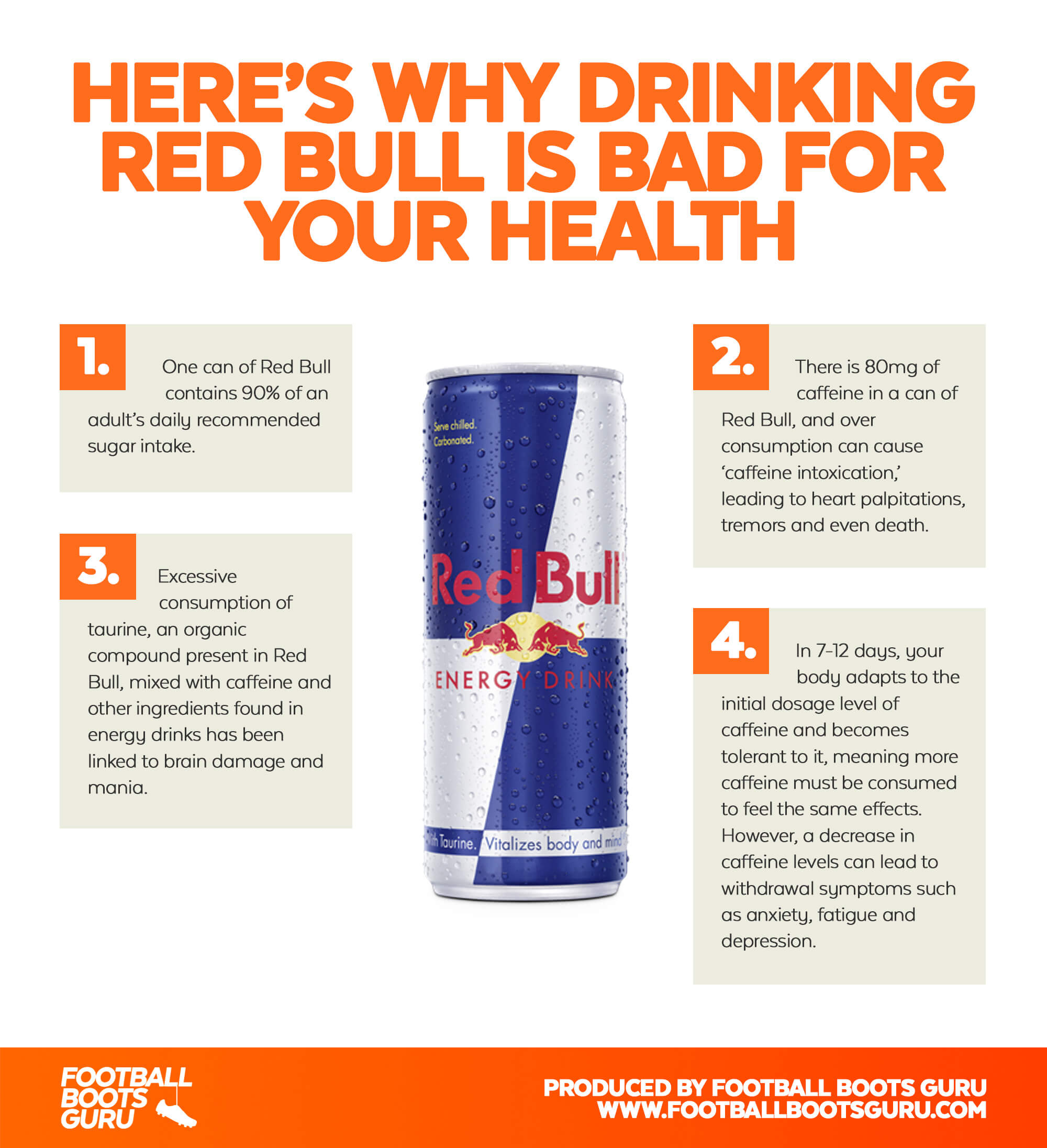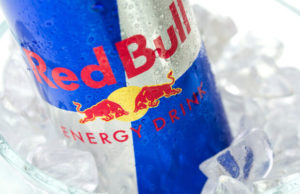Red Bull is everywhere! In fact, a massive 6.302 billion cans of the energy drink are sold every year. The brand spends millions of pounds a year on creative marketing campaigns and sponsorships so it’s hard to miss them. If it’s not people dressed in ridiculous outfits launching themselves off a pier in ridiculous aircraft, it’s Jamie Vardy not thinking twice about knocking back a can or three before a match.
The company has grown massively as a franchise. From its humble Thai beginnings as a drink aimed at fuelling factory workers, Red Bull is now a global brand that has fingers in multiple pies; from football clubs to extreme sports competitions and even F1 cars.
So if a top sportsman who has represented his country is drinking it, surely Red Bull is good for you? We’ve decided to investigate the health benefits (or implications) of consuming the popular energy drink and discover some interesting and downright bizarre facts about Red Bull along the way.
Is Red Bull bad for you? The health issues associated with Red Bull

Heres why drinking Red Bull is bad for your health
1. Sugar definitely isn’t ‘sweet’

Hey, sugar!
How much sugar is there in Red Bull? The answer is a lot. Sugar is most definitely sweet in a literal sense, but in terms of it being a good thing, it most certainly is not.
There is 26g of sugar in one can of Red Bull. To put that into context, the recommended daily amount in the UK is 30g. So just by drinking one can you will consume 90% of your daily sugar intake.
Whilst that’s no real surprise, given the fact that Red Bull aims to provide a momentary high and instill energy into its consumers. Nevertheless, the high percentage means drinking it causes the risk of diabetes, high blood pressure, and heart failure.
2. Caffeine ain’t the dream

Pictured: a Red Bull drinker terrified of caffeine overdosing
Tea, coffee, and Coke all contain high levels of caffeine, and it’s well known that Red Bull does too. If you’re looking to get a boost early in the morning or perhaps fuel an all-nighter then, of course, Red Bull is ideal.
However, when drinking Red Bull on a regular basis, caffeine overdosing or ‘caffeine intoxication’ is a very real and serious issue. What are the symptoms of caffeine intoxication? Trembling, rapid heartbeats and anxiety can all be suffered when too much caffeine is consumed. Researchers also believe death from caffeine intoxication is not unrealistic.
3. A warning about taurine

Fearlessly optimistic after consuming taurine
You’ve probably never heard of the amino acid taurine before. That’s because not much is widely know about it. What we do know is that taurine is an organic compound that helps to build protein and can most likely be found in meat and fish.
Isolated, it’s not a threat and causes no real harm to anybody – no cases of negative side effects have been reported. However, several issues have come up surrounding its use when consumed with other substances such as caffeine.
There has been a direct link between taurine consumption in the form of drinking Red Bull and brain damage and mania. Alone, taurine is a simple and safe substance but when consuming it the form of an energy drink, excessive consumption is definitely not recommended.
4. Dependency dilemma

To drink or not to drink?
Research has shown that it takes just 7-12 days for your body to become tolerant to caffeine. This means that if you drink two cans of Red Bull a week apart from one another, the effect you’ll feel from that second drink will not be as intense as the first drink because your body’s tolerance increases.
Therefore, to feel the benefits of Red Bull and caffeine, you’ll have to up your dosage and consumption, which leads to various health problems. However, cutting your consumption can also lead to withdrawal symptoms as our bodies are susceptible to becoming dependant on certain types of substances. These symptoms include anxiety, depression, and fatigue.
So does Red Bull give you wings?
In a literal sense, no, Red Bull doesn’t give you wings. This has been legally settled in court in 2014, where the energy drink brand lost a $13m lawsuit for falsely claiming their product gave consumers wings.
However, in the metaphorical sense that they were undoubtedly refering to, yes Red Bull does give you wings in the form of a boost of energy; whether or not it is akin to flying we will let you decide. If you’re looking for a quick boost in the morning or perhaps a little kick late at night to keep you going, the energy that Red Bull provides is ideal. Moderation is the key. Excessive consumption and dependence are where things begin to get dangerous.
Is Red Bull good for you?
Despite containing some ingredients that in isolation are good and healthy, Red Bull is definitely not good for you, nor is it healthy. It is effective at doing what it is meant to do, instill energy and provide a boost, but the underlying health implications of overconsumption (and even regular consumption) mean it really should be avoided as a recreational drink and used only when needed.
What are the side effects of drinking Red Bull?
As mentioned above, the bad health effects of drinking Red Bull are vast and sometimes permanent. The amount of caffeine present in the drink is the main problem, with withdrawal symptoms very common if the ‘fix’ is not met.
The short term effects of drinking Red Bull are; palpitations, depression, nausea, fatigue, insomnia, and tiredness.
The long term effects of drinking Red Bull can be heart problems, high blood pressure, diabetes, detrimental dental health, brain damage, mental health issues and in the most extreme circumstances, death.





